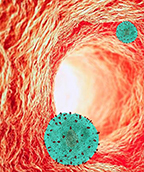PhD Studentship (Grenoble & Leeds) – Physics vs. Chemistry of Cell Capture at the Blood Vessel Wall

- This has passed.
PhD Studentship (Grenoble & Leeds) – Physics vs. Chemistry of Cell Capture at the Blood Vessel Wall
7th June 2020 - 3rd July 2020
Navigation

In this interdisciplinary project, the PhD student will use in vitro systems to study how the glycan-rich layer on the endothelial cells lining blood vessels helps regulating the selective capture of cells from the circulation into tissues using biomechanical and biochemical signals.
Cell capture under flow at the wall of blood vessels is a critical physiological process: red blood cell adhesion should be avoided to prevent blood clots, and immune and stem cell adhesion is tightly regulated for proper immune/inflammatory responses, and for tissue repair. How the selective capture of cells is controlled is not well understood. It is clear though that this involves biomechanical and biochemical cues, and knowing how these signals are coupled would help to devise new ways to control immune cell recruitment and homing of stem cells, or to interfere with pathogen invasion and tumour metastasis.
The first and critical step of cell capture is mediated by the endothelial glycocalyx, a soft and glycan-rich coat on the blood vessel wall. To elucidate how biomechanical and biochemical cues in the glycocalyx are coupled to regulate cell capture, biomimetic surfaces will be developed that present selected components of the blood vessel wall in a tunable way, building on our extended experience on simpler glycocalyx models. Combined with laminar flow assays, these surfaces will enable quantitative cellular and cell-mimetic studies in a well-defined environment, and subsequent analysis with theories from soft matter and biological physics.
The PhD student will be exposed to and work with state-of-the-art surface biofunctionalization and physico-chemical characterization, microfluidics and advanced optical microscopy methods, cell culture as well as soft matter and biological physics concepts. Training on all these methods will be provided as required.
Location and practical aspects
Grenoble is a pleasant city located in the French Alps. It is one of the most renowned scientific areas in France, providing a vibrant and collaborative scientific environment.
This project is part of an ongoing collaboration between the University Grenoble Alpes (UGA) and the University of Leeds (UoL). The successful applicant will be hosted by the Laboratory of Interdisciplinary Physics (LIPhy) at UGA, in the research group Mechanics of Cells in Complex Media (MC2). He/she will work under the supervision of Dr. Delphine Débarre (UGA) and Dr. Ralf Richter (UoL). The project will comprise extended secondments to the Richter Lab at UoL.
The studentship is for 3 years, and can be started between September 2020 and January 2021. The working language is English. The gross salary will be 1787 €/month, equivalent to a net salary of 1414 €/month.
Qualifications of the applicant
We are looking for an enthusiastic and rigorous experimentalist with a background in biochemistry, physical chemistry, biophysics, bioengineering, soft matter physics, or a closely related field, and keen interest in multidisciplinary work. Experience with biosurface science or cell culture, and affinity for data modelling, are an advantage.
Applications
Interested candidates should write Delphine Débarre (delphine.debarre@univ-grenoblealpes.fr) and Ralf Richter (r.richter@leeds.ac.uk) with their motivation letter, CV, transcript of university record, and contact information of two referees (indicate “PhD studentship – Glycocalyx” as e-mail subject). Application deadline: 03/07/2020.
